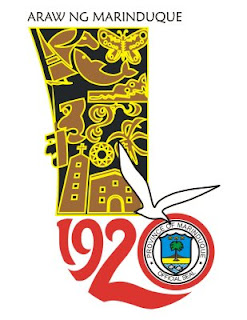
The past celebrations that coincided with the Philippine International Arts Festival were consistently supported during the 3-year period with appropriate grants from the National Commission for Culture and the Arts (NCCA). The province of Marinduque, then declared a priority area for culture and arts development, was the only provincial LGU having been granted that kind of NCCA support for three consecutive years.
 Excerpts from the minutes, 59th Regular Session, 11th Sangguniang Panlalawigan, Gov. Damian J. Reyes Session Hall, January 28, 2009:
Excerpts from the minutes, 59th Regular Session, 11th Sangguniang Panlalawigan, Gov. Damian J. Reyes Session Hall, January 28, 2009:Resolution No. 534 series 2009
RESOLUTION ENACTING PROVINCIAL ORDINANCE NO. 81 Series 2009
“Be it ordained by the Sangguniang Panlalawigan of Marinduque in Session assembled, the following:
“AN ORDINANCE DECLARING FEBRUARY TWENTY-ONE OF EVERY YEAR AS “ARAW NG MARINDUQUE”
“Authored by Hon. Yolando R. Querubin
"Section 1. DECLARATION. In commemoration of the re-establishment of Marinduque as an independent province on February 21, 1920, through Act No. 2880 signed by then American Governor-General Francis Burton Harrison, the 21st day of February of every year is hereby declared as “ARAW NG MARINDUQUE”.
 "Section 2. BRIEF POLITICAL HISTORY OF MARINDUQUE.
"Section 2. BRIEF POLITICAL HISTORY OF MARINDUQUE.When Martin de Goiti and Juan de Salcedo, two Spanish conquistadores, returned to the Philippine islands in 1569, and conquered Manila, they stayed on to establish other settlements in the region.
"Marinduque, together with Mindoro, the southeast part of Laguna and Camarines was made a part of Batangas when the latter was founded in 1581 by the Spaniards. (Balayan was the capital from 1597-1732; Taal, earlier known as Bonbon, in 1732; then Batangas (the present city) in 1754).
"Early in the 17th century, the island of Marinduque was separatd from Batangas and became a part of Mindoro as a corregimiento, town. In 1671 Marinduque functioned as a province but was later reduced as a Mindoro sub-province.
 "On April 28, 1898, with the overthrow of the last Spanish casadores (Tagalog soldiers) after armed conflict and hostilities with the revolutionists during the Philippine-Spanish War, Marinduque declared its separation from Mindoro and from Spanish rule, a move that was ratified by the ruling class from the different towns of the island-province. The local struggle was led by Martin Lardizabal, who was military governor of Marinduque’s first revolutionary provincial government.
"On April 28, 1898, with the overthrow of the last Spanish casadores (Tagalog soldiers) after armed conflict and hostilities with the revolutionists during the Philippine-Spanish War, Marinduque declared its separation from Mindoro and from Spanish rule, a move that was ratified by the ruling class from the different towns of the island-province. The local struggle was led by Martin Lardizabal, who was military governor of Marinduque’s first revolutionary provincial government."The first major victory of the Filipinos during the second phase of the Philippine revolution (the Filipino-American War), in Marinduque (1900-1901), occurred at the Battle of Pulang Lupa (Torrijos), when local forces led by Col. Maximo Abad defeated the American contingent under the command of Capt. Deverieux Shields. (The said battle was considered one of the most dramatic reversals the Americans suffered during the war with the Philippines).

"On May 1, 1901, the United States-Philippine Commission (The Philippine Commission was a body appointed by the President of the United States to exercise legislative and limited executive powers in 1901, acting as the upper house of a bicameral legislature, with the elected Philippine Assembly acting as lower house. The Jones Act of 1916 later created an elected Philippine Senate to replace the Philippine Commission), passed Act No. 125 which created the Province of Marinduque, composed of the islands of Marinduque, and the adjacent small islands. The provincial government was established in the municipality of Boac, the capital.
"By virtue of Act No. 423, dated June 23, 1902, the US-Philippine Commission annexed the island of Mindoro, including the island of Lubang (then separated from Cavite), to the Province of Marinduque. Boac remained as the capital of the consolidated provinces.
"Four months later, on November 10, 1902, by virtue of Act No. 499, Marinduque was made a part of the Province of Tayabas, the present Quezon. On May 17, 1907, under Act No. 1649, the Commission made Marinduque a sub-province of Tayabas with Juan Nieva as Lieutenant Governor.
 "Finally, on February 21, 1920, Act No. 2280, sponsored in the Lower House by elected representative Ricardo Paras of Marinduque, separated the sub-province of Marinduque from Tayabas and re-established the former Province of Marinduque. The law was signed by American Governor-General Francis Burton Harrison.
"Finally, on February 21, 1920, Act No. 2280, sponsored in the Lower House by elected representative Ricardo Paras of Marinduque, separated the sub-province of Marinduque from Tayabas and re-established the former Province of Marinduque. The law was signed by American Governor-General Francis Burton Harrison."Section 3. Contestability Clause. Any person or entity/organization who might find that February 21, 1920 was not the exact date when Act No. 2880 was signed into law may contest this Ordinance upon presentation of validated documents and evidences.
Section 4. Effectivity. This Ordinance shall take effect immediately upon approval.
"Adopted, this 28th day of January 2009, at Boac, Marinduque on motion of Hon. Yolando R. Querubin, duly seconded by Hon. Jose F. Alvarez.
"Certified Correct: NIMFA M. CABRERA, Secretary, SP
"Attested: ILDEFONSO P. DELOS SANTOS, SP Member & Temporary Presiding Officer
"Approved: JOSE ANTONIO N. CARRION, Governor"












No comments:
Post a Comment